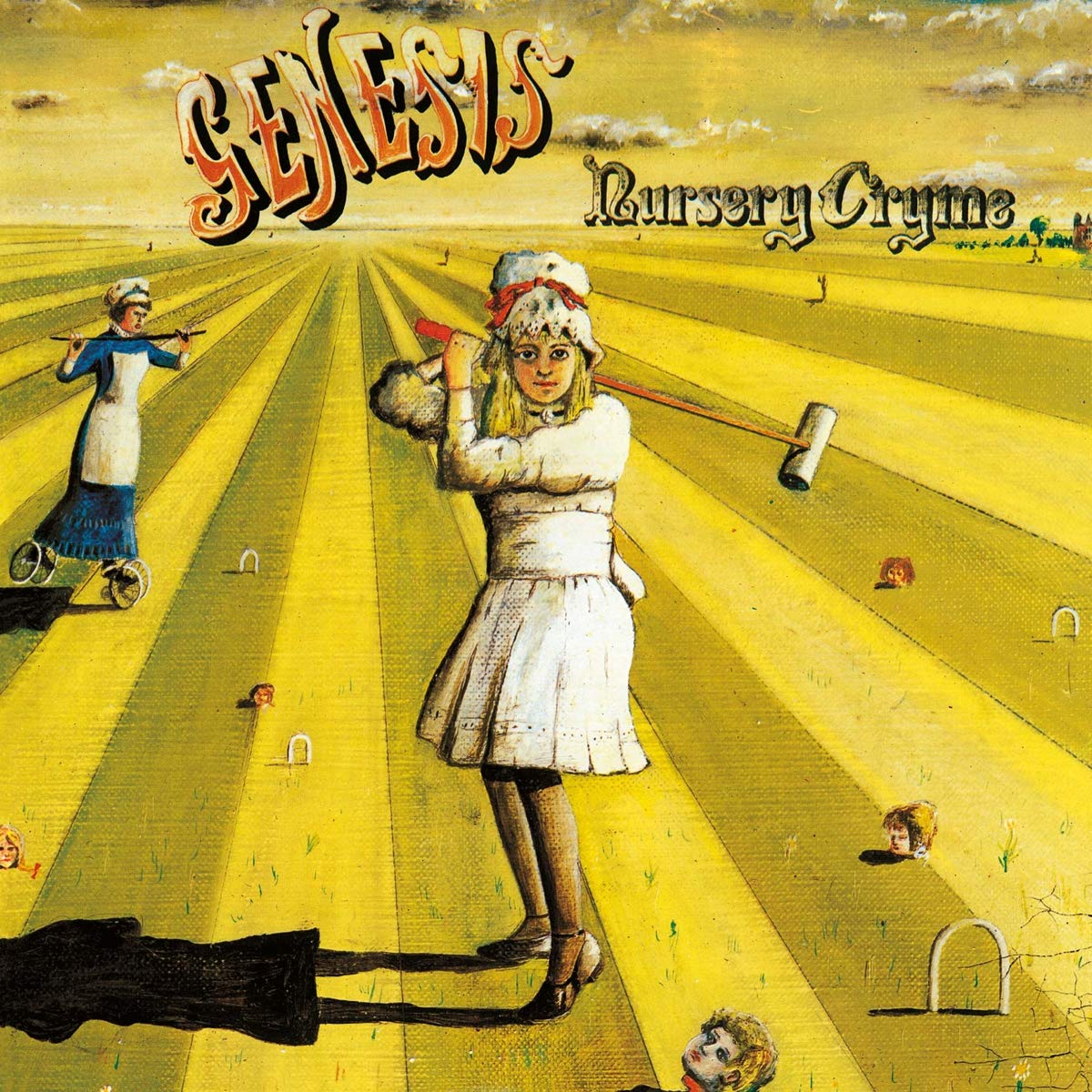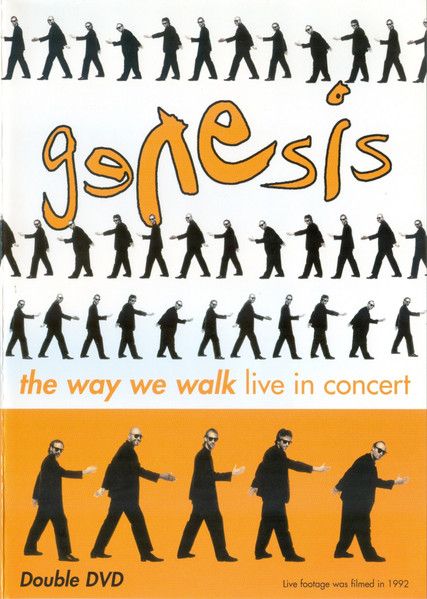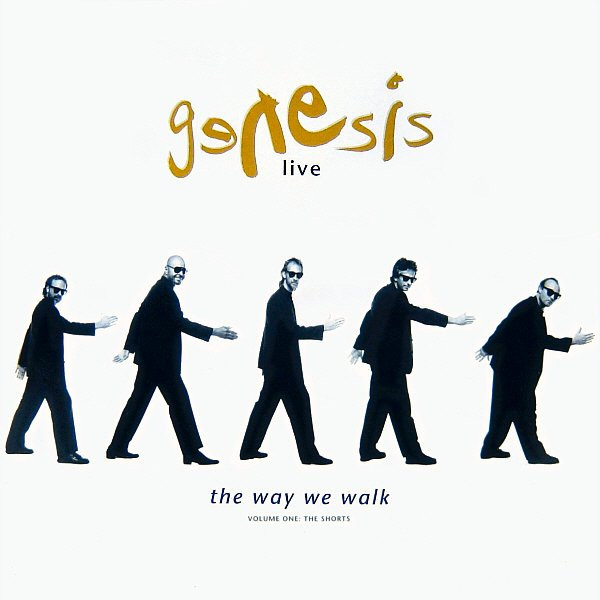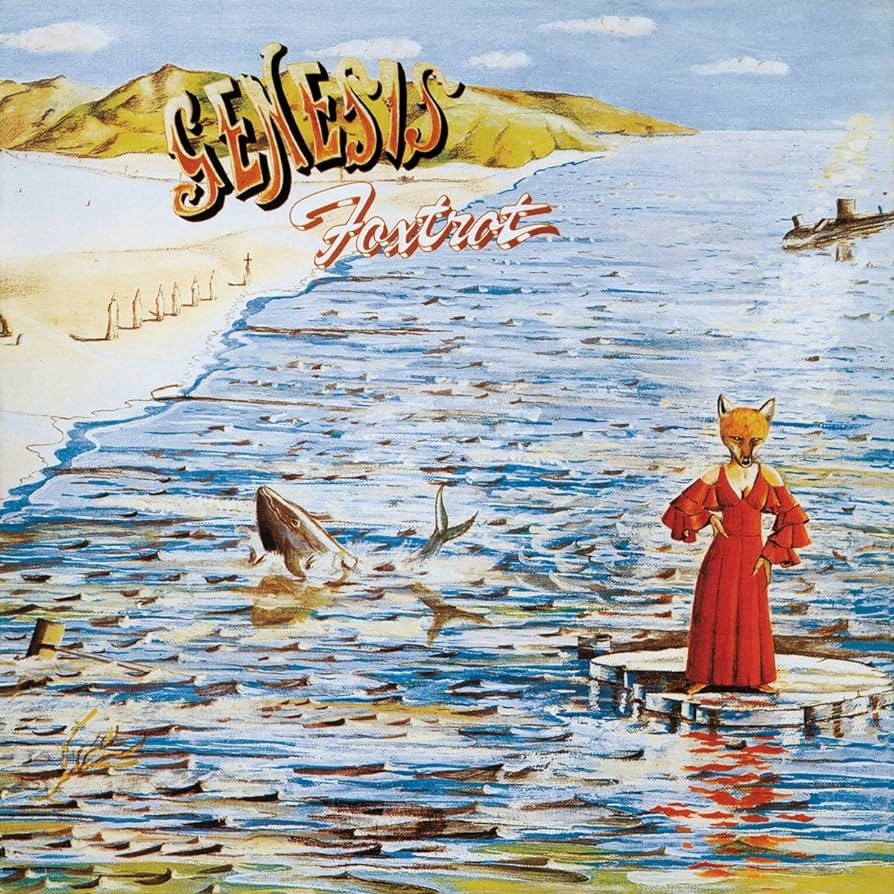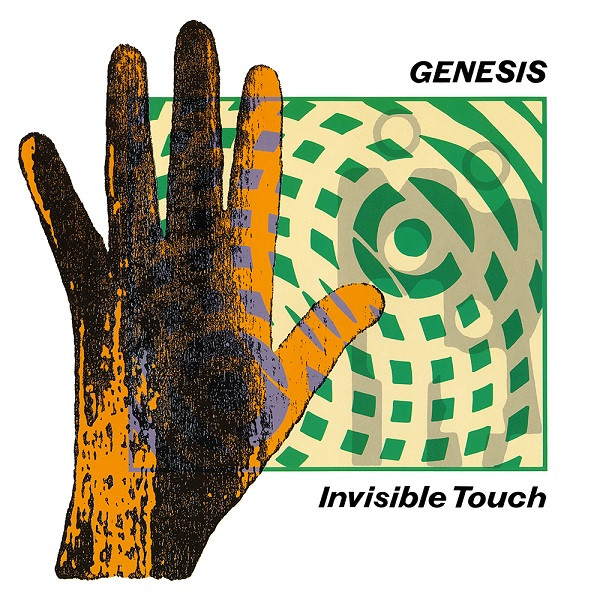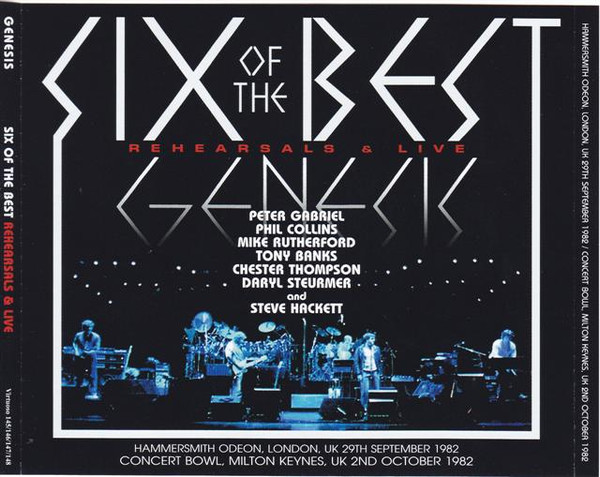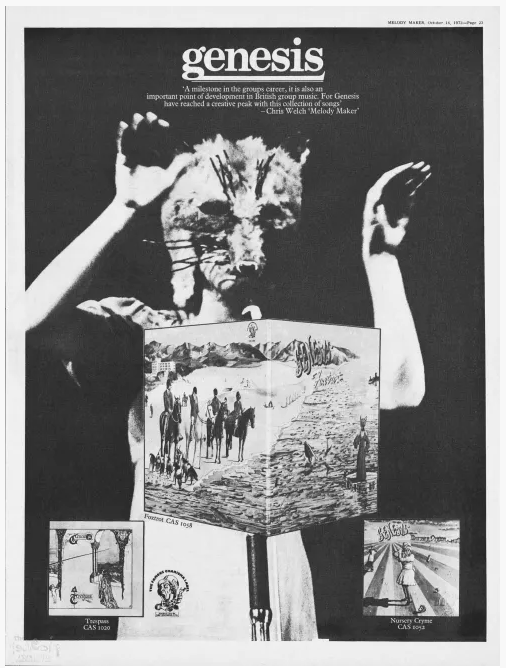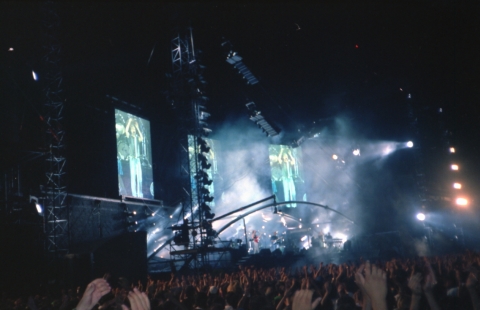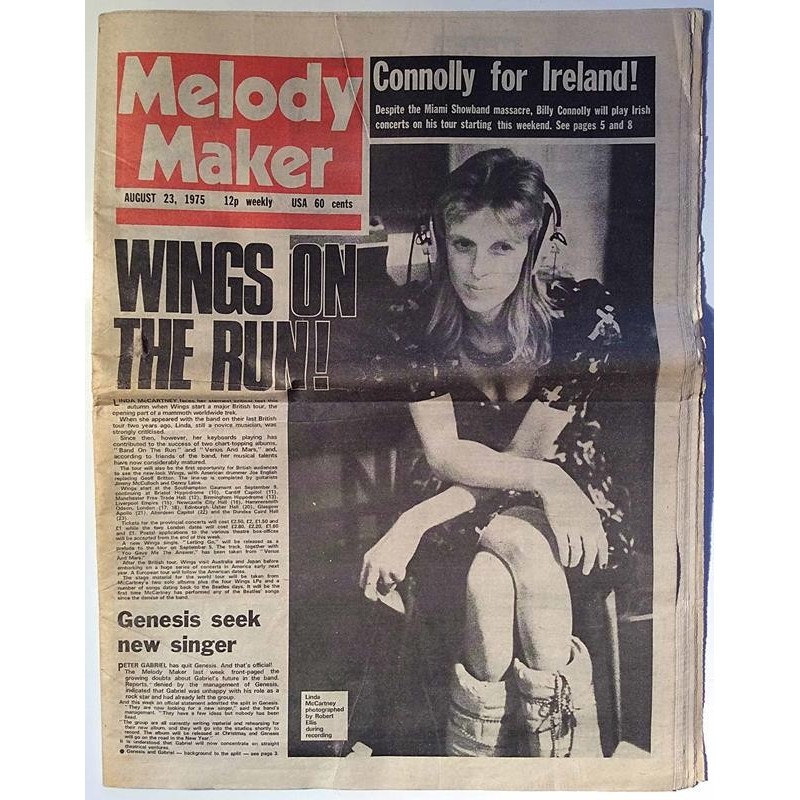In November 1971, Genesis released Nursery Cryme, their third studio album and a turning point in their musical evolution. It marked the arrival of guitarist Steve Hackett and drummer Phil Collins, whose contributions would shape the band’s signature progressive rock sound.
Continue reading “Nursery Cryme (1971) – Genesis”Genesis – The Way We Walk: Live in Concert DVD Review
The Way We Walk – Live in Concert, originally released in 1993 and reissued on DVD in 2001, offers fans an intimate and electrifying glimpse into the band’s We Can’t Dance tour. Filmed over three nights at London’s Earls Court in November 1992, this concert video is a vibrant showcase of Genesis’s remarkable musicianship and theatrical flair.
Continue reading “Genesis – The Way We Walk: Live in Concert DVD Review”The Shorts (1992) – Genesis
In November 1992, Genesis released The Shorts, the first volume of their dual live album project, The Way We Walk. This release marked a departure from the typical live double-album format that encapsulates an entire show. Instead, Genesis took a bold approach by splitting their 1992 tour recordings into two thematic compilations: The Shorts—a collection of their most recent hits—and The Longs, featuring their extended, experimental tracks and a medley from the ’70s.
Continue reading “The Shorts (1992) – Genesis”We Can’t Dance (1991) – Genesis
We Can’t Dance marked Genesis’ 1991 return following an intensive period of solo projects and the global success of their previous Invisible Touch tour, which captivated 3.5 million fans across 112 shows but left the band physically and emotionally spent. Personal experiences, including Mike Rutherford’s loss of his father and complications during his son Harry’s birth, shaped the hiatus that saw Mike successfully releasing The Living Years with Mike + The Mechanics, and Phil Collins achieving massive success with …But Seriously and its accompanying tour. The band reconvened at The Farm, their private studio in Surrey, in March 1991, producing We Can’t Dance over six months. This album would become the final Genesis album with Collins as lead vocalist.
Continue reading “We Can’t Dance (1991) – Genesis”Foxtrot (1972) – Genesis
It’s the year 1972. Genesis had released Nursery Cryme the year before and had played their first show overseas in Brussels in early 1972. Several shows in Europe followed and after their return to the UK, they began writing their next album Foxtrot, which, for many fans, would become their ‘progressive’ high point.
Continue reading “Foxtrot (1972) – Genesis”Invisible Touch (1986) – Genesis
Phil Collins: ‘The mid-1980s was the biggest we ever got.’1
By the mid-1980s, there were longer gaps between Genesis albums. Phil Collins had launched his solo career at the start of the decade, and after their previous Genesis album, Mike Rutherford formed the hugely successful Mike + The Mechanics with vocalists Paul Carrack and Paul Young. Tony Banks, who had been releasing solo albums since 1979, remained the only member of the trio without significant chart success.
In 1985, Genesis reconvened at their studio, The Farm, with producer Hugh Padgham to begin work on a new album. The result was Invisible Touch, a bold, vibrant collection of songs released in 1986. Of the album’s eight tracks, five became major hit singles: “Tonight, Tonight, Tonight,” “Land of Confusion,” “In Too Deep,” “Throwing It All Away,” and the title track, “Invisible Touch.”
Invisible Touch
The lead single “Invisible Touch” is often viewed by die-hard progressive rock fans as a commercial betrayal – a far cry from Genesis’ roots. Yet the song, like all tracks on the album, was born from the band’s collaborative jam sessions. Engineer Paul Gomersall, who worked alongside Padgham, described their creative process:
‘Mike would come up with some sort of wacky drum loop. He’d bring his drum machine in, or Phil would, and they’d work around that. Mike is very experimental. I think he sees himself as more like a Brian Eno sort of person who makes interesting sounds and rhythms. Tony’s stuff was more chordal. Half the sound of Genesis is the chords that Tony comes up with.’2
“Invisible Touch” emerged when Mike played a guitar riff with an echo effect, prompting Phil to sing the now-iconic line, “She seems to have an invisible touch, yeah!” Phil penned the lyrics about being irresistibly drawn to someone mysterious and overpowering, even when it’s not good for you.
The song, like the rest of the album, features electronic drum sounds typical of ’80s pop. The rhythm was inspired by Sheila E.’s and Prince’s “The Glamorous Life” (1985). With Mike’s bassline, Tony’s keyboard solo, and a key change in the outro, “Invisible Touch” becomes a dynamic, infectious pop anthem.
Phil Collins: ‘Invisible Touch is my favourite Genesis song.’3
Live, the band always performed the song in a lower key to reduce strain on Phil’s voice. Still, he turned it into a crowd-pleasing singalong. Mike Rutherford also named it one of his live favourites, calling it ‘a wonderful song: upbeat, fun to play, always a strong moment in any gig.’4
Though a commercial triumph (Genesis’ only US No. 1 single), for some fans it marked a sellout. It even earned a mention in American Psycho, where Patrick Bateman dubs it the band’s ‘undisputed masterpiece.’
Tonight, Tonight, Tonight
Described by music journalist Chris Welch as the band’s ‘most memorable pop ballad,’5 “Tonight, Tonight, Tonight” features a haunting electronic motif and lyrics that are both abstract and direct.
The album version runs over nine minutes and showcases the band’s classic style. Originally titled “Monkey/Zulu,” the song grew from a jam session led by Tony Banks, who improvised the extended instrumental section, complete with strange, evocative effects. Phil’s stark lyrics, partly improvised, deal with drug addiction.
Mike Rutherford: ‘It’s more of the old-style Genesis in that it covers a lot of ground musically and has a fairly involved instrumental passage in the middle. We’ve done songs like this from the word go. The initial bit came from an improvised jam and the song and solo part in the middle were obvious from a longer section when Tony was just improvising sound over a rhythm being played by Phil and I and he just assembled a composed solo part.‘6
He added that Tony is ‘the most adventurous‘7 in terms of structure, always pushing the band to break from the traditional verse-chorus format.
Land of Confusion
Mike Rutherford wrote the lyrics for this rare political track, tackling international tensions. ‘It’s a political song about the mess we landed in. I’ve always shielded away from doing what I call a preachy song, a protest song, but it seemed to work. Maybe because the music was quite angry it made it work.’8
Musically, it was a group effort.
The Spitting Image Video
“Land of Confusion” became iconic thanks to its music video, featuring grotesque puppets from the British satirical TV show Spitting Image. Genesis, along with caricatures of politicians like Reagan, Thatcher, and Brezhnev, appeared in a surreal nightmare sequence.
The idea came when Genesis video director Jim Yukich saw Phil parodied on Spitting Image. On the show, puppet Phil performed a spoof love ballad called “Oh, You Must Be Leaving,” crying throughout.
In the video, Reagan is shown in bed with his wife and a monkey, a nod to his film Bedtime for Bonzo. The clip also features puppets of musicians like Bob Dylan, Tina Turner, and Michael Jackson. It won the band their only Grammy: Best Concept Music Video in 1987.
Tony Banks: ‘What other video can boast having all these stars, like Madonna and Prince?’9
In Too Deep
In 1985, Ray Cooper of Handmade Films (George Harrison’s company) asked Phil to write a song for Mona Lisa starring Bob Hoskins and Cathy Tyson. While touring in Australia, Phil composed the chorus of “In Too Deep.” But since Genesis were about to start working on a new album, he brought the idea to the band.
The result: a warm, elegant pop ballad. Phil’s tender vocals are complemented by Tony’s piano and Mike’s subtle guitar work. Cooper loved it, and the song became a hit in its own right.
Tony later noted the challenge of filming the video, which simply showed the band performing: ‘The most difficult videos for us in many ways were the ones that you didn’t really have anything do. So things like ‘so ‘In Too Deep’ I remember being a bit of a struggle because it’s just a love song. How do you do it? So we just did it with us, almost like a cabaret thing.’10
Anything She Does
Fast-paced and synth-heavy, this track features Tony Banks’ layered brass sounds and Phil’s punchy drums. The lyrics, about tabloid models, inspired the band to cast British comedian Benny Hill as Fred Scuttle in the video.
Phil called Hill himself. Though hesitant to reinforce his “dirty old man” image, Hill agreed if his character never actually got the girls. The video was set backstage at Wembley, with Hill as a doorman keeping out eager women. Phil cherished the signed photo he received afterward.
Domino
The album’s epic track, “Domino,” is split into two contrasting parts: “In the Glow of the Night” and “The Last Domino.” The first is slow and atmospheric; the second faster and rhythmically intense.
Tony Banks wrote the lyrics, capturing loneliness and despair during wartime.
Mike Rutherford: ‘His words are the reason why he’ll never write a hit single.’11
Phil Collins: ‘We were always a group of songwriters who would write 3-, 10- and 20-minute songs. We still write 10-minute songs, like ‘Domino’, but unfortunately, the three-minute songs have gotten better and become hits. I don’t feel we’ve bastardized the way we were, as we still work the same way. Diehard fans will say, ‘Rubbish. ‘The Carpet Crawlers, ‘I Know What I Like’ – that was progressive!’ But I don’t see that. We’d have killed for hit singles back in the early days!‘12
Mike added, ‘Looking back, people forget the show’s an hour and three quarters maybe and the costumes were probably 15 minutes of the whole thing. When we started having hit singles with MTV and videos, a hit single overshadowed the whole album and people started sort of saying ‘You stopped doing long songs.’ We never did, really, every album had a sort of 15-minute-long song on it till the very end. But they were album tracks, so they weren’t on television, they weren’t on the radio, but live they were a big part of the set.’13
Throwing It All Away
Built around a looping guitar riff by Mike, “Throwing It All Away” is another emotional song that plays to Phil’s strengths as a vocalist. Despite its melancholic lyrics, the song feels optimistic and breezy, another showcase of the trio’s songwriting synergy. Mike also penned the lyrics.
It became famous live for its audience call-and-response.
Drummer Chester Thompson called it his favourite to play live: ‘The crazy thing about that is that the full kit only comes in the last bit of the song, it’s mostly just hi-hat and bass drum and then you finally come in towards the end, but I just thought it was such a great feel, I loved playing that song.’14
The music video was composed of footage from the band’s 1986 tour, capturing Genesis in their prime.
The Brazilian
The final track on Invisible Touch is the instrumental “The Brazilian”, a piece filled with off-kilter electric percussion and eerie half-tone steps. It’s undeniably, as music journalist Chris Welch puts it, ‘the strangest and most demanding cut on the album.’ He describes it as ‘a re-affirmation of the band’s faith in its musical past, […] full of spacey sounds like a sea monster, breathing heavily and stomping up the beach.’15
Reception
Music journalist Chris Welch believes that Invisible Touch comes closest to being Genesis’s ‘ultimate album’.16 Biographers Dave Bowler and Bryan Dray agree, writing that it is ‘certainly it was their best album since ‘Wind And Wuthering’‘ and ‘one of the very best albums of the 1980s.’17 . Yet, fan reactions were not unanimously positive. Alan Hewitt, founder of the official Genesis fanzine The Waiting Room, famously remarked that Invisible Touch was ‘the first Genesis album he ever played once and then turned into a frisbee‘.18
Tony Banks, however, defends the album’s diversity and ambition: ‘On ‘Invisible Touch’, you’ve got the ‘Domino’ suite, which is 12 minutes long, and ‘Tonight, Tonight, Tonight’, which is about nine minutes. Both are identifiably Genesis, the sort of thing that no one else does. If you add, say ‘The Brazilian’, which again is like no other group, you’ve got at least 50% of the album. There are songs like ‘Invisible Touch’ and ‘Throwing It All Away’, but we’ve always done those. It’s just that we do them better now. With the songs, say off ‘The Lamb Lies Down’, maybe they’re lyrically more complex, but in terms of the songs themselves – ‘Carpet Crawlers’ or ‘Counting Out Time’ – they’re all attempts at the same kind of things. Even ‘From Genesis to Revelation’ was all short songs, all attempts at writing hit singles. And all failed.‘19
The multi-platinum success of Invisible Touch made it the band’s biggest commercial triumph, both critically and commercially. Tracks like “Invisible Touch,” “Land of Confusion,” and “Tonight, Tonight, Tonight” dominated international charts in 1986 and 1987. In the United States, where chart rankings also factored in radio airplay, even the non-single “Anything She Does” managed to chart. Meanwhile, MTV played the band’s videos in heavy rotation, giving Genesis an added boost in the age of music television.
Tony Banks reflected on this success with some nostalgia: ‘It’s great having hits. I was brought up in the era of hits, in the 60s the next Beatles song coming out was the sort of high point of my existence.’20
Interestingly, Peter Gabriel, who had left Genesis a decade earlier, found himself sharing the spotlight with his former band. “Invisible Touch” was famously knocked off the No. 1 spot by Gabriel’s own hit “Sledgehammer.” His 1986 album So became his most successful release. It was, without a doubt, a remarkable year for both Genesis and its former frontman.
The Invisible Touch Tour
Mike Rutherford looked back on that time, saying: ‘A lot of people came to see us in the 80s and 90s in America because of the hit singles, but I always knew the long songs would grab them. They were songs that were visually were impressive with the vari-lites. Those who came to see us because of the singles and the radio tracks went away with a different impression of us.‘21
The album’s success led to a massive world tour that saw Genesis perform in stadiums and arenas across Europe and North America. The tour also included several dates in Japan — only their second visit to the country — and, for the first time, shows in New Zealand and Australia. It all culminated in a record-breaking run of four consecutive nights at Wembley Stadium in London in 1987.
Phil Collins later recalled: ‘The Wembley shows were very special. It was still the old Wembley; it was football territory. Everything just seemed to peak at that point. I’ve been thinking about the set of the time with ‘Home By The Sea’, where the lights were coming down.’22
Those iconic Wembley concerts were filmed using Sony’s then-cutting-edge High Definition technology and released as a home video, a first for the band.
After wrapping up the tour in 1987, Phil Collins, Mike Rutherford, and Tony Banks returned to their respective solo projects. The band wouldn’t reconvene until 1991 to record what would become their final studio album with Collins, We Can’t Dance.
Sources
Banks, Tony; Collins, Phil; Gabriel, Peter; Hackett, Steve; Rutherford, Mike; Dodd, Philip (2007): Genesis. Chapter & verse. New York: Thomas Dunne Books/St. Martin’s Griffin.
Barnett, Laura, ‘Phil Collins and Mike Rutherford: How we made Invisible Touch’, The Guardian (14 October 2014).
Bowler, Dave; Dray, Bryan (1992): Genesis. A biography. London: Sidgwick & Jackson.
CHESTER THOMPSON FULL INTERVIEW : HOW HE WENT FROM ZAPPA TO DRUMMING WITH GENESIS & PHIL COLLINS.
Genesis – Behind The Track (Land Of Confusion).
Hewitt, Alan, Opening the Musical Box – A Genesis Chronicle. (Firefly Publishing, 2000).
Holm-Hudson, Kevin (2008): Genesis and the lamb lies down on Broadway. Aldershot, England, Burlington, VT: Ashgate.
MIKE RUTHERFORD UNFILTERED: GENESIS GUITARIST/COMPOSER IN CONVERSATION.
PHIL COLLINS: HOW I GOT THE GENESIS AUDIENCES LAUGHING.
Platts, Robin (2007): Genesis. Behind the lines, 1967-2007. Burlington, Ont., Canada: Collectors Guide Pub.
Room, Adrian (1990): An A to Z of British life. Oxford: Oxford University Press.
Rutherford, Mike, The Living Years: The First Genesis Memoir. (Macmillan, 2014).
Thompson, Dave (2005): Turn it on again. Peter Gabriel, Phil Collins & Genesis. San Francisco: Backbeat Books.
‘Tony Banks Interview from ‘Genesis Songbook DVD’.
TONY BANKS UNFILTERED: GENESIS KEYBOARD PLAYER & COMPOSER IN CONVERSATION . FULL.. 1 Hour 53 Mins.
Welch, Chris (2005): Genesis. The complete guide to their music. London: Omnibus Press.
- Collins 2007: 263. ↩︎
- in Platts 2007: 133. ↩︎
- Barnett, Laura, ‘Phil Collins and Mike Rutherford: How we made Invisible Touch’, The Guardian (14 October 2014). ↩︎
- Barnett, Laura, ‘Phil Collins and Mike Rutherford: How we made Invisible Touch’, The Guardian (14 October 2014). ↩︎
- Welch 2005: 68. ↩︎
- Bowler & Dray 1992: 202. ↩︎
- Ibid. ↩︎
- Genesis – Behind The Track (Land Of Confusion). ↩︎
- Tony Banks Interview from ‘Genesis Songbook DVD. ↩︎
- GENESIS ON THEIR 2007 LIVE TOUR – LOWERING THE KEY. COLLINS.BANKS.RUTHERFORD. BACK AT THE FARM .PT 3 (currently not available on YouTube.) ↩︎
- Rutherford 2014: p. 150. ↩︎
- Thompson 2005: 224. ↩︎
- MIKE RUTHERFORD UNFILTERED: GENESIS GUITARIST/COMPOSER IN CONVERSATION. ↩︎
- CHESTER THOMPSON FULL INTERVIEW : HOW HE WENT FROM ZAPPA TO DRUMMING WITH GENESIS & PHIL COLLINS. ↩︎
- Welch 2005: 70. ↩︎
- Welch 2005: 68. ↩︎
- Bowler & Dray 1992: 201; 205. ↩︎
- Thompson 2005: 225. ↩︎
- Platts 2007: 134. ↩︎
- TONY BANKS UNFILTERED: GENESIS KEYBOARD PLAYER & COMPOSER IN CONVERSATION . FULL.. 1 Hour 53 Mins. ↩︎
- MIKE RUTHERFORD UNFILTERED: GENESIS GUITARIST/COMPOSER IN CONVERSATION. ↩︎
- PHIL COLLINS: HOW I GOT THE GENESIS AUDIENCES LAUGHING. ↩︎
Six Of The Best
On October 2, 1982, the legendary ‘Six Of The Best’ reunion show with Peter Gabriel and Genesis took place at Milton Keynes.
Continue reading “Six Of The Best”Dublin, 28 Sept 1972: Peter Gabriel wears a fox head and a red dress
On 28 September 1972, Peter Gabriel appeared onstage during ‘The Musical Box’ with the foxes’ head and the red dress from the Foxtrot album cover.
Continue reading “Dublin, 28 Sept 1972: Peter Gabriel wears a fox head and a red dress”Phil Collins’ last gig with Genesis at Cowdray Ruins on 18 September 1993
On 18 September 1993, Genesis played their last gig with Phil Collins at Cowdray Ruins before he left the band.
Genesis in 1993
1993 was a quiet year for Genesis. In 1992, the group had been on their huge’We Can’t Dance tour‘ following their 1991 album We Can’t Dance*. 1993 saw them returning to their solo projects. Phil Collins’ marriage to his second wife Jill started to fall apart with the tabloid press publishing story over story about the family. Phil wrote and released his solo album Both Sides*, a very dark and angry and certainly his most personal album, which unfortunately did not go very well with the critics. In these turbulent times, Genesis only played one gig, when they resurfaced briefly for ‘a charity gig at Cowdray Ruins in aid of the King Edward VII hospice where they were joined by such rock alumni as Pink Floyd and the remaining members of Queen.’1
Queen performed a set of songs with Roger Taylor and Paul Young from Mike and the Mechanics on vocals. Then Genesis took the stage, but not with their regular live members Chester Thompson on drums and Daryl Stuermer on bass and guitar. Instead, Roger Taylor of Queen and Gary Wallis of Mike and the Mechanivs played drums for them and bass/guitar was played by Mike’s bandmate from Mike and the Mechanics, Tim Renwick, who also played with Pink Floyd.
Genesis’ reunion in the picturesque scenery among these famous headliners saw them playing ‘Turn It On Again’, ‘Hold On My Heart’, ‘I Can’t Dance’ and ‘Tonight Tonight Tonight’/’Invisible Touch’. According to some sources, they were also said to have played Phil Collins’s solo song ‘That’s Just The Way It Is’, but that is highly doubtable.
Next up was Pink Floyd who played some of their classic tracks from the 1970s, some also sung by Paul Young and with Mike on bass. Phil remembers: ‘The Floyd I’ve never loved apart from ‘Arnold Layne’. But we did this gig…I went to the sound check, and I was listening to the Floyd and a couple of the things they played I thought ‘I quite like that. There’s a couple of things in there that, you know. They show promise.”2
After Pink Floyd, Eric Clapton played a few songs (with Mike playing bass) and at the end, the ‘All Star Cowdray Ruins Band’, a band that featured everyone that had performed that night, played ‘Ain’t That Peculiar’, ‘Can I Get A Witness’ and ‘Gimme Some Loving’. YouTube videos and audio recordings of the show exist, but in a very low quality, which is a shame when considering this was Phil’s last gig with Genesis.
It was a successful, but ‘low-profile show’ and ‘few people would have ever believed that it was also Phil Collins’s final appearance with the band he’d now fronted for 18 unexpected years’3.
The show may have been one of the reasons for Phil to leave Genesis, as he remembers: ‘In the middle of my writing and making BOTH SIDES, Genesis did a concert with Queen. […] But I didn’t enjoy it … As I was singing these songs, it didn’t feel natural. Obviously, it was bad timing, going just like that from doing my most personal thing to a Genesis thing and back. But it definitely felt like ‘What am I doing here?’, like shoes that don’t fit anymore’.’4
Some time after this gig, Phil decided to leave Genesis, but his departure would not be announced until 1996. But that’s another story.
The line-up of the Cowdray Ruins band (according to the programme):
TONY BANKS: Genesis Keyboards
ERIC CLAPTON Guitar
PHIL COLLINS Genesis Vocals
JOHN DEACON Queen Bass
DAVID GILMOUR Pink Floyd Guitar
ADRIAN LEE Mike &. Mech Keyboards
NICK MASON Pink Floyd Drums
TIM RENWICK Mech./Floyd Bass/Guitar
MIKE RUTHERFORD Genesis Guitar/Bass
ROGER TAYLOR Queen Vocals/Drums
GARRY WALLIS Drums
RICHARD WRIGHT Pink Floyd Keyboards
PAUL YOUNG Mike &. Mech Vocals
Source: YouTube
Sources
Hewitt, Alan (2000): Opening The Musical Box. London: Firefly Publishing.
Platts, Robin (2007): Genesis. Behind the lines, 1967-2007. Burlington, Ont., Canada: Collectors Guide Pub.
Thompson, Dave (2005): Turn it on again. Peter Gabriel, Phil Collins & Genesis. San Francisco: Backbeat Books.
Title photo: Genesis in corcerto. Nizza – Luglio 1992 . Source: Wikimedia Commons, Valerio Ravaglia / CC BY (https://creativecommons.org/licenses/by/3.0).
* = affiliate links
‘Peter Gabriel Quits Genesis’ – Melody Maker 23th August 1975
A week after The Melody Maker had rumoured about Peter Gabriel’s decision to leave Genesis, the departure was confirmed with the cover story ‘Genesis Seek New Singer’.
Chris Welch recalls a great British Band
At this point, the band had already moved on and worked on what became their next album A Trick of The Tail. Peter Gabriel’s departure was old news for them, but now, they had to deal with the media. For them, Genesis could not exist without Gabriel and his visuals. In the eyes of the critics, he was the band, not just a member of the team. Naturally, the band felt upset by the obtiuary. In The Melody Maker, journalist Chris Welch ‘recalls a great British Band’.
The front page of Melody Maker from 23 August 1975
Several news papers reported about Peter Gabriel’s departure on 23 August 1975. The front page of Melody Maker said:
Genesis seek new singer
PETER GABRIEL has quit Genesis. And that’s official!
The Melody Maker last week front-paged the growing doubts about Gabriel’s future in the band. Reports, denied by the management of Genesis, indicated that Gabriel was unhappy with his role as a rock star and had already left the group.
And this week an official statement admitted the split in Genesis. “They are now looking for a new singer,” said the band’s management. “They have a few ideas but nobody has been fixed.”
“The group are currently writing material and rehearsing for their new album, and they will go into the studio shortly to record. The album will be released at Christmas and Genesis will go on the road in the New Year.”
It is understood that Gabriel will now concentrate on straight theatrical ventures.
Of course, the band was interviewed by the press after the news had come out. Phil Collins remarked that the rest of the band ‘…were not stunned by Peter’s departure because we had known about it for quite a while.’1 They had already decided to carry on without him and interestingly, the new singer was already in the group and was exactly the same member who had exclaimed the statement from the Melody Maker‘s article above. But that’s another story.
Title photo: Front page of Melody Maker 23 August 1975
Listen to recordings from The Lamb tour on “Genesis – BBC Broadcasts” – Get it here!*
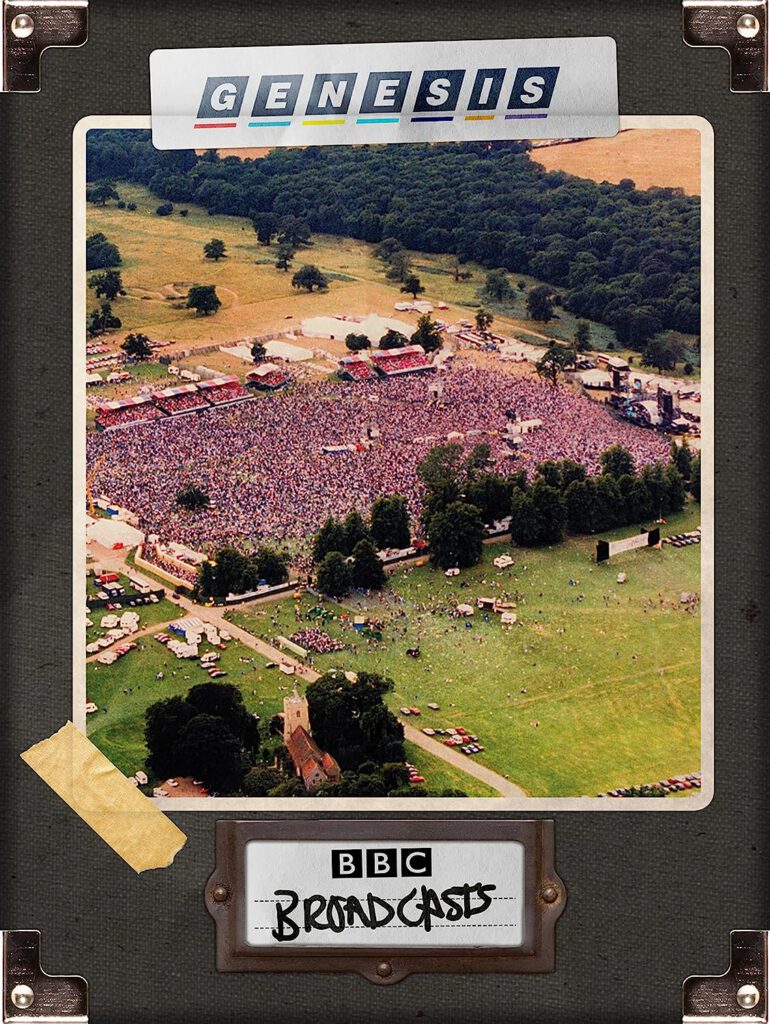
Genesis Music on Amazon*
*= Affiliate Link
- Welch, Chris. “Peter Gabriel Quits Genesis”. Melody Maker, 23 August 1975. ↩︎

